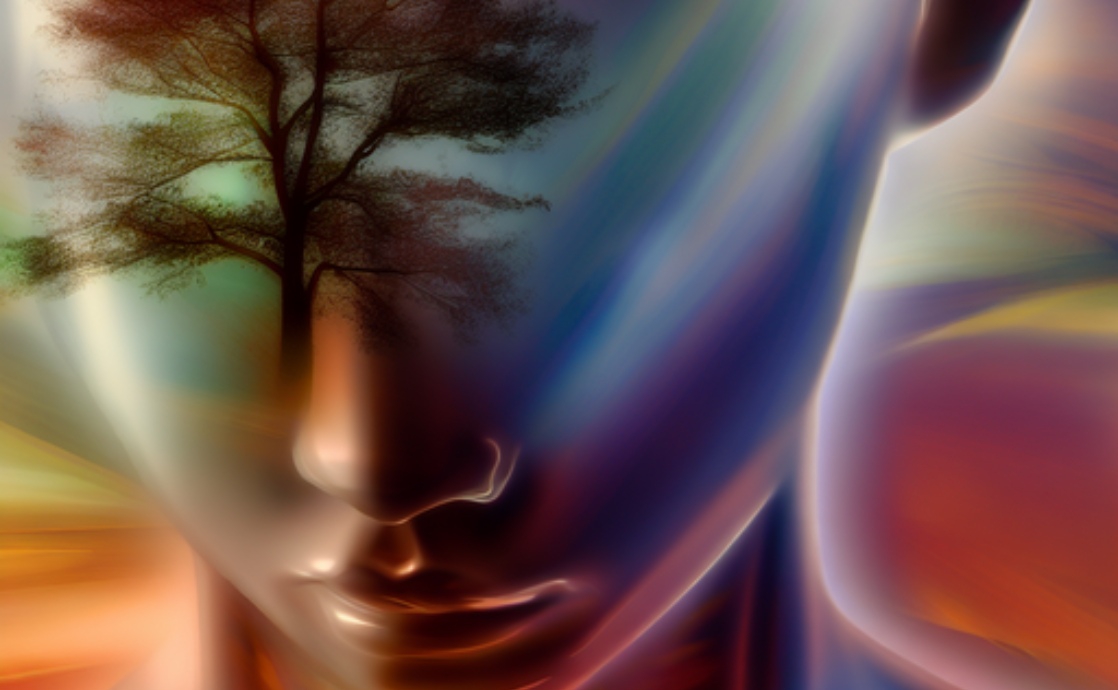The views expressed in our content reflect individual perspectives and do not represent the authoritative views of the Baha'i Faith.
Let’s face it, the “world’s equilibrium hath been upset,” just as Baha’u’llah wrote in the 19th century. Perhaps the best evidence of that is the epidemic of mental illness that now afflicts humanity.
We’ve all noticed it, and seen it grow gradually worse. As far back as 2017, global statistics and studies indicated that approximately 792 million worldwide have a mental health disorder. That’s ten per cent of the entire planet’s population – and those are only the reported cases. During the ensuing pandemic, things got even worse, and the stresses and isolation it caused meant even more mental health issues arose.
RELATED: What is the Mind? The Struggle for Mental Health
In the most recent issue of The Journal of Baha’i Studies, John Hatcher writes that an:
… understanding of reality, and in particular the reality of the human being, has meaningful consequences not only for our abstract understanding of the self, but for practical approaches to treating affective disorders whose prevalence continues to rise in our communities.
This expansive view of mental health means that optimal mental functioning in human beings rests upon a basic understanding – that reality does not reside exclusively in materialist facts, nor in the 3-pound organ of the brain alone, but in our perceptions of a wider spiritual existence.
Therefore, if we remain unaware that we are spiritual beings, we will forever be frustrated in our search for our true selves.
Identifying the Source of Our Psychic Pain
Many psychologists – the well-intentioned products of reductionist scientific training – identify the chemistry of the brain as the sole source of psychic and psychological pain. This means that if health care workers aren’t conversant with the reality of the essential self, or soul, the real source of the patient’s complaint can remain cloaked and undiagnosed.
As a result of this strictly chemistry-focused approach, psychotropic drugs are readily prescribed to quiet or elevate those disturbances which appear to be emanating from the brain alone, with the essential self left to fend for itself. But in this way, depression and anxiety may actually be enigmatic whispers of the soul about love, kindness, compassion, patience, etc.
The source of “affective” mental health disorders, therefore, reside in either the patient’s or the therapist’s unawareness of spiritual reality, an ignorance which is sure to entangle and enmesh itself further and further away from the reality of the essential self, and with far-reaching and often life-altering consequences for patients and their families and friends.
Surely our daily witness to casual violence and cruelty, social media mayhem, and lack of spiritual and psychological wisdom has distracted us from our fundamental human duty – to find our true purpose in spite of the world, and to achieve our true self amidst its ruins. So many people without an awareness of those duties become hungry ghosts, worthy of our prayers and support.
Are You in Crisis Right Now?
I intend, in all of this, to address those of you who may be in crisis at this very moment, people who feel out of balance, distressed, with no knowledge of a spiritual reality, and without any sure way to understand such a thing.
Hopefully this idea can cut through the academic verbiage of mental health discourse altogether.
Consider that all things in creation – every bird, bug, and bush – has an original organizing order and perfection. The music of the thrush, the silence of the stone, the murmur of water, even the orbits of planets, and every furthermost speck, including the minds of men and women now crying out for help from beneath the wreckage and woe of emotional crises, contain that order and perfection. They do so in a language that the brain is eager to understand but can’t, because the brain by itself is spiritually ignorant without assistance from the soul.
I say, let the cure go straight to the soul, which is, now and forever, pristine, perfect, and recoverable. Let the elixir of inner healing be applied there, infused with the force of spiritual integrity, the courage to know one’s true self, and the spiritual imagination to accept the poetry of what I am about to humbly suggest, as inspired by Abdu’l-Baha.
Become Blessed Trees
When he metaphorically exhorted the Baha’is in his Tablets of the Divine Plan to become “Blessed Trees” rooted in the Word of God, Abdu’l-Baha offered radical instruction as to how to imagine who we are spiritually, how to interpret the cryptic messages of an unquiet soul, and how to heal and become our true selves:
If you abide by the precepts and teachings of [Baha’u’llah], the heavenly world and ancient Kingdom will be yours — eternal happiness, love and everlasting life. The divine bounties are flowing. Each one of you has been given the opportunity of becoming a tree yielding abundant fruits. … The verdure and foliage of spiritual growth are appearing in great abundance in the gardens of human hearts. Know ye the value of these passing days and vanishing nights.
Abdu’l-Baha also wrote:
Praise be to God, ye are firm and steadfast; be ye thankful that like unto blessed trees ye are firmly planted in the soil of the Covenant. It is sure that every firm one will grow, will yield new fruits and will increase daily in freshness and grace. … For when the winds of tests blow, the frail trees are uprooted while the blessed trees are made firm and immovable.
The venerable image of a tree, therefore, planted like an internal imaginative lattice in the mind’s eye, serves as organic form with which to organize one’s spiritual understanding as vertically ascending and horizontally reaching. Like mature trees we are inwardly impelled, and outwardly of service to the world, and thus the dispeller of what otherwise occupies our conflicted inner spaces, but now with dynamic direction, fiery purpose, and loving patience, all spiritual imperatives which will never allow themselves to be misinterpreted by the brain or diluted by drugs.
It has worked for me.
In this way, the metaphor of the tree contains, concentrates, and channels the energy of the soul, and represents that kind of powerful organizing principle which escapes so many of us.
A meta-metaphor like this speaks directly to the essential self, because it replicates the symbolic language of the soul – obscured and redacted by an overeager, all-too-literal, and hapless brain, and by well-intentioned therapists who are unaware of any such underlying spiritual reality or the language needed to speak of it.
RELATED: Finding the Hidden Mysteries in Ourselves – and In the Universe
The Purpose of Being Alive
Consider that the very purpose of being alive is to emerge from an unconscious state to an awakened state, forever fulfilling an upward attraction to light while mindful of the Earth which feeds us. Think about it: trees occupy a paradoxical place between heaven and earth, their form and function oriented toward the stars but beholden to the soil, just like us.
The tree of humanity, then, forms a mind-mixture of two worlds, at the crossroads of height and depth, spirituality and materiality – which precisely describes our position in life, as the metaphor of the tree suggests so well.
Baha’i philosopher William Hatcher used the figure of the tree to explain human psychology, altogether, and the evolution of human consciousness, the oneness of humanity, and our coming of age as world citizens:
Just as a tree must push its roots deeper as it grows higher, so must each external step forward have an internal concomitant. The individual must, at each stage, become less self-centered. He must give his loyalty to and identify with an every-widening circle of his fellow humans. . . Whereas ‘brother’ first meant physical brother, it gradually came to mean fellow Jew, fellow brother in Christ, fellow countryman, and must ultimately mean fellow world citizen. There is, in short, a gradual increase in the consciousness of the individual, and it is this new consciousness which alone allows the new unity, the new external step forward, to take place on a spiritual basis. This new depth of individual spiritual awareness also serves to increase the quality of unity at all levels. . . .
Mind you, the tree is only one powerful metaphor borrowed from what Baha’is call the Book of Creation, Baha’u’llah’s term for the entire natural environment, from which most Baha’i metaphors arise. All such metaphors participate in Baha’i cosmology and harbor spiritual meaning unique to themselves, implanted there by the Creator, that we might discern in all things mineral, vegetable, animal and spiritual, the secrets of creation.
In fact, in the Baha’i writings, we are offered a vast mind-scape of such symbols, images, and metaphors, from birds warbling, streams gushing, and, yes, trees swaying at dawn, as one familiar Baha’i prayer describes the mystical experience of being a Baha’i.
The tree, therefore, serves as one metaphor we can use to imagine a new identity-vessel, a new psychological and ethereal structure for one’s essential self. It requires only an act of spiritual imagination to plant it, and thus to begin to transmute what buries us into what makes us alive, what is being garbled by the rational brain into a coherent intellectual and spiritual language.
In other words, the Baha’i teachings offer to take root within us like a tree, infused with the living water of virtue, impelled to grow and develop according to spiritual law, and prepared to offer love and support and clarity of mind to those who do not otherwise know who they are. In this way, knowledge of sacred metaphor and fair use of the spiritual imagination is not make-believe, but a tough-love prescription, a moral imperative.
Miller’s most recent book is Sickness, Death, and Resurrection of Holden Caulfield, available on Amazon.
You May Also Like
Comments

















"(Shoghi Effendi) Abdu'l-Baha describes the scientific power as the "discoverer of…secrets of the material universe", hence it is noteworthy that the Guardian highlights ...the role of scientists in finding cures.